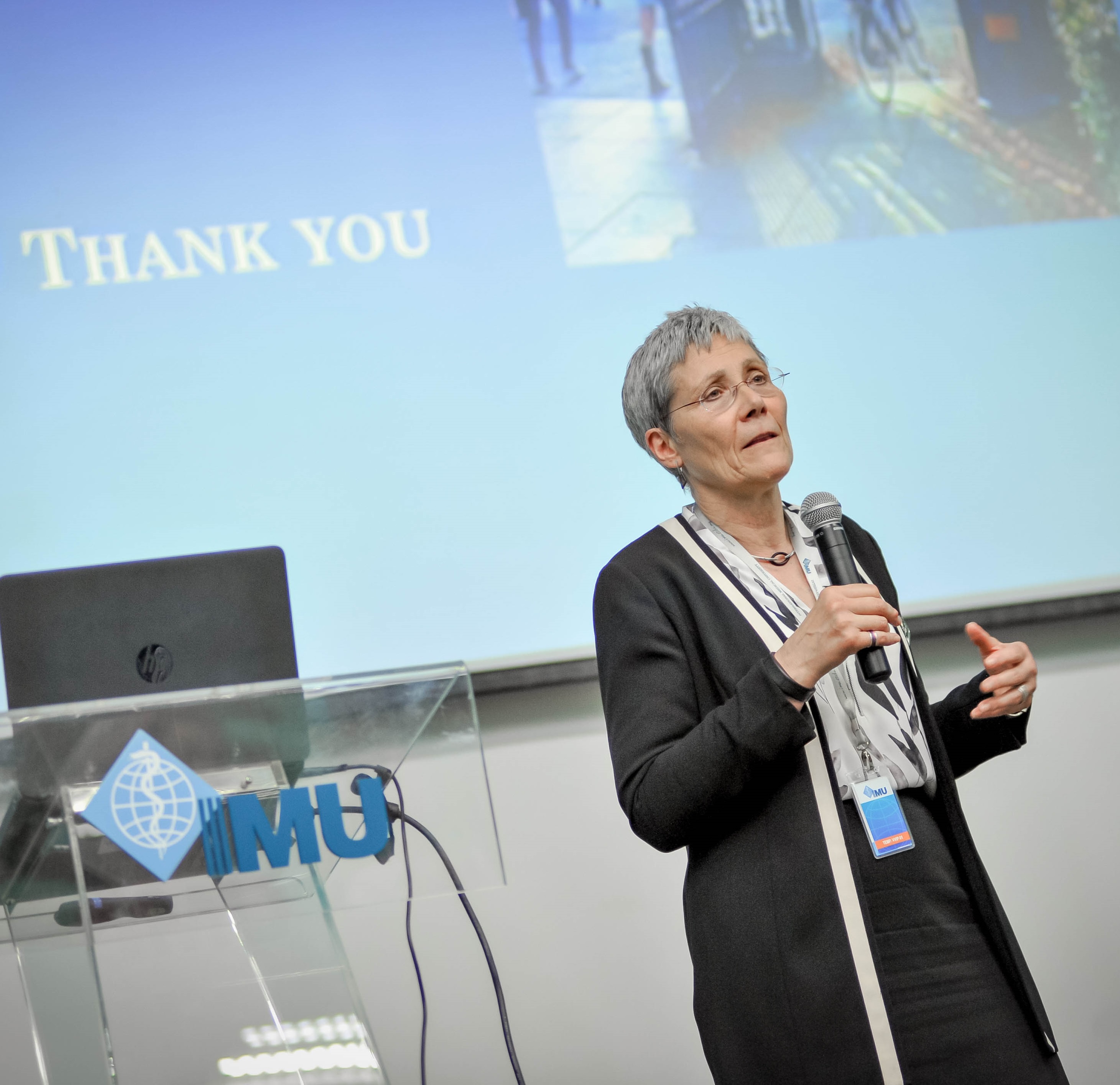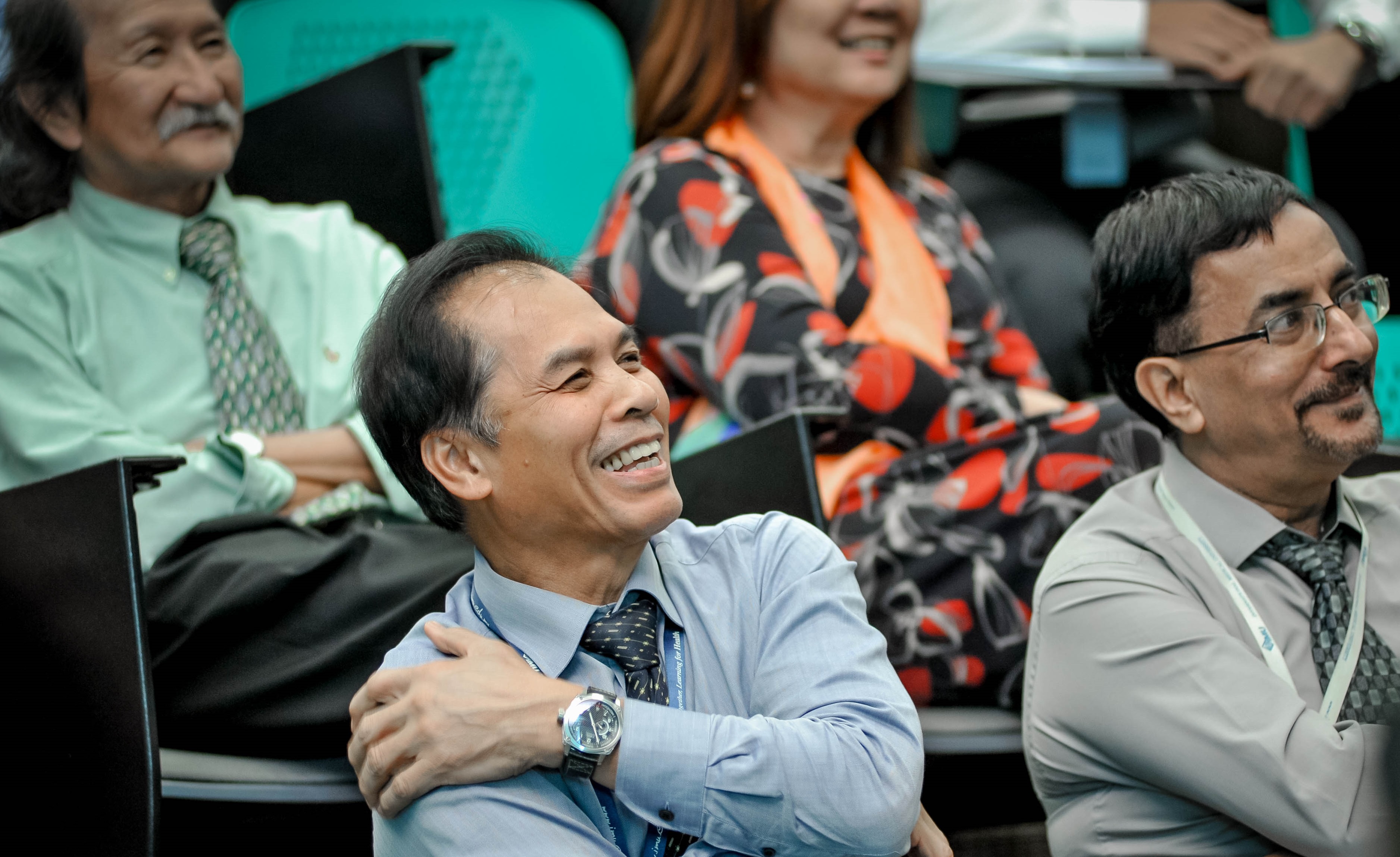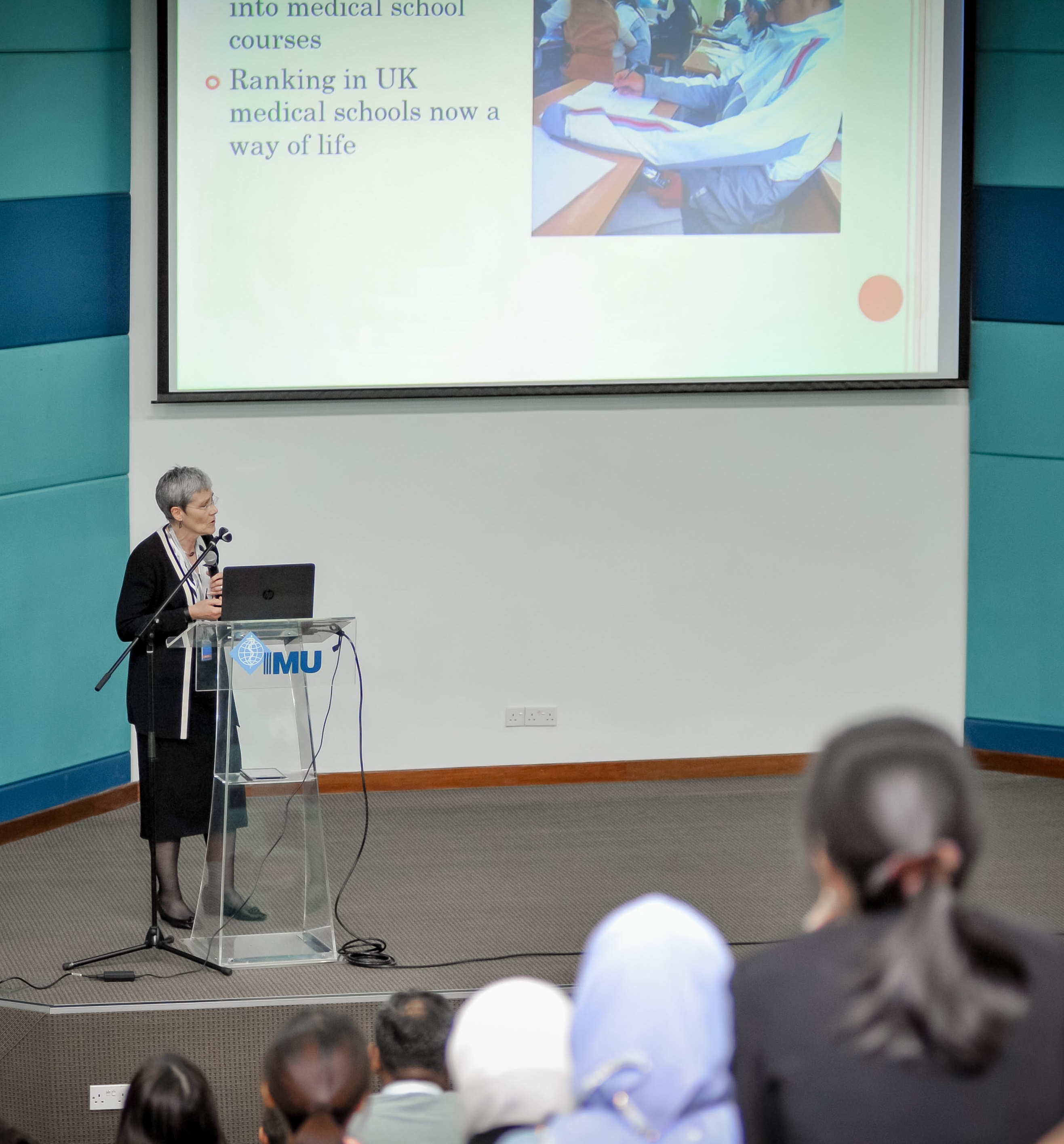What are the implications of personal and professional integrity in the medical and healthcare sector? Does it matter what you do in your own time? Are you “once a doctor, always a doctor”? Does cheating on your medical studies disqualify you from entering the profession? What constitutes cheating? Are ‘little white lies’ acceptable?
Prof Trudie Roberts, Director of Leeds Institute of Medical Education and President of the Association for Medical Education in Europe (AMEE) who visited with the International Medical University (IMU) in September as the 2017 Ronald Harding Visiting Professor (RHVP) addressed the above questions and more, in a plenary session on “Professional Integrity: Challenges & Consequences” .
Attended by an audience of 100 to 120 persons, comprising of medical students and members of the faculty from IMU and other Malaysian universities, the plenary was engaging and triggered many thought-provoking questions.
 What is cheating? Prof Roberts defined it simply as “breaking the rules to get ahead”. Numerous examples were cited to show the depth and breadth of occurrences, each with their own particular set of circumstances. This helped establish that each incident has to be viewed individually, assessing the circumstances and hence the motive behind the infraction. In some instances, practical solutions were introduced to address the root trigger of the act in the first place. In other cases, past records had to be reviewed to determine if the student was prone to dishonest behaviour. Prof Roberts shared statistics in relation to the percentage of nurses, pharmacists and medical students who admitted to cheating. More phenomenally, the percentage of those who cheat while in medical school (5%) is much lower than those who cheat to get into medical school (80%)! So why is there so much pressure to perform? Prof Roberts shared “There is a huge pressure to get into medical school courses. It is not good enough to get into university – you’ve got to get into the right university and the right course.” And where is all that pressure coming from? These are questions that need to be asked within the fraternity.
What is cheating? Prof Roberts defined it simply as “breaking the rules to get ahead”. Numerous examples were cited to show the depth and breadth of occurrences, each with their own particular set of circumstances. This helped establish that each incident has to be viewed individually, assessing the circumstances and hence the motive behind the infraction. In some instances, practical solutions were introduced to address the root trigger of the act in the first place. In other cases, past records had to be reviewed to determine if the student was prone to dishonest behaviour. Prof Roberts shared statistics in relation to the percentage of nurses, pharmacists and medical students who admitted to cheating. More phenomenally, the percentage of those who cheat while in medical school (5%) is much lower than those who cheat to get into medical school (80%)! So why is there so much pressure to perform? Prof Roberts shared “There is a huge pressure to get into medical school courses. It is not good enough to get into university – you’ve got to get into the right university and the right course.” And where is all that pressure coming from? These are questions that need to be asked within the fraternity.
The issue of ranking in medical graduates was also addressed. Prof Roberts shared about the re-introduction of a ranking of graduates in the mid 2000s. First, into quartiles, then later into deciles. These rankings were meant to help graduates to get the jobs they want. But what it does not take into account, is the implications on those who would end up in the lower deciles. “We graduate about 7300 students a year. If you ranked students, somebody must have been ranked 7300th. It doesn’t mean to say that they are not competent because they’ve graduated but how would you like to know that you are number 7300 in the country and what will that do to your self esteem but somebody has to be [like] that.”, she explained.
The area of student support was also raised for consideration. “What about actually supporting students and trying to understand why they feel the need to cheat?” Professor Roberts suggested, adding that the aim is not just to stop students from cheating, but more importantly, ensuring that the graduates are ready and have a certain level of competence upon graduation. “…it’s making sure that on that first night when you’re on call in the hospital with little help and support, that you can do it because you passed all your assessment and proved to yourself, your peers, your employers, your patients, your teachers that you can cope with this.”  She went on to emphasise on the key being TRUST. It is only natural for any patient to say, “I wouldn’t want to be treated by cheating doctors.” And yet, the best predictor of future behaviour is past behaviour. And so it is established that this area needs to be addressed even before graduation. If a medical student cheats on a test, what is the likelihood that the same student would not cheat on a diagnosis or patient care form in the future as a medical practitioner? The other aspect to consider is that these doctors could one day be treating those closest and dearest to you as well. And hence, attitude and behaviours go hand-in-hand. As Prof Roberts shared based on a senior lecturer who did his PhD on student cheating, “intention and behaviour are linked.” “Three things that influence behaviour is your attitude to performing that behaviour, your subjective norm to performing that behaviour, and your belief about your ability to perform that behaviour.” Prof Roberts added that what helped her in her role in dealing with students caught cheating was to “break down the actions, try to understand why they did what they did and address those things.” Another area to be considered in assessing cheating is the value system. When asked what bearing values have on our behaviour Prof Roberts’ response was most insightful – “I think you’re right, that we need to revisit our values because some values are unchanging but there are some values that do change; for example, patriarchy or doctor knows best or patients don’t question the doctors. Those things have now changed and could be changing whereas other things such as honesty and integrity are timeless.” In encouraging all present to examine shared values regularly, she was also quick to stress that this should be done together with the students as well, to ensure buy in from all concerned. There is also a need to keep revisiting these values and keeping the document ‘live’ so to speak, to ensure it is not introduced ceremoniously then tucked away and forgotten.
She went on to emphasise on the key being TRUST. It is only natural for any patient to say, “I wouldn’t want to be treated by cheating doctors.” And yet, the best predictor of future behaviour is past behaviour. And so it is established that this area needs to be addressed even before graduation. If a medical student cheats on a test, what is the likelihood that the same student would not cheat on a diagnosis or patient care form in the future as a medical practitioner? The other aspect to consider is that these doctors could one day be treating those closest and dearest to you as well. And hence, attitude and behaviours go hand-in-hand. As Prof Roberts shared based on a senior lecturer who did his PhD on student cheating, “intention and behaviour are linked.” “Three things that influence behaviour is your attitude to performing that behaviour, your subjective norm to performing that behaviour, and your belief about your ability to perform that behaviour.” Prof Roberts added that what helped her in her role in dealing with students caught cheating was to “break down the actions, try to understand why they did what they did and address those things.” Another area to be considered in assessing cheating is the value system. When asked what bearing values have on our behaviour Prof Roberts’ response was most insightful – “I think you’re right, that we need to revisit our values because some values are unchanging but there are some values that do change; for example, patriarchy or doctor knows best or patients don’t question the doctors. Those things have now changed and could be changing whereas other things such as honesty and integrity are timeless.” In encouraging all present to examine shared values regularly, she was also quick to stress that this should be done together with the students as well, to ensure buy in from all concerned. There is also a need to keep revisiting these values and keeping the document ‘live’ so to speak, to ensure it is not introduced ceremoniously then tucked away and forgotten.  “Like it or not, we are all role models,” she reminded, concluding that cheating can in fact be considered the worst crime for medical students. She qualifies this by relating how it affects those most dear to us, and that the healthcare industry is all about trust. So whether training to be a doctor, pharmacist or nurse, professional integrity is of utmost importance. Senior practitioners are also encouraged to be honest enough to admit their own mistakes and share what they have done about it as well. Knowing that none of us are perfect and even the most senior of us have struggled with integrity issues helps graduates and new recruits to embrace the reality of the temptations and struggles that they too will face. In discussing appropriate penalties for cheating, they ranged from expulsion to suspension, to reflective essays which are guided and graded, as well as putting students in front of patients or other medical graduates who have made wrong choices to witness for themselves the impact of poor behaviour and a lack of discipline in the profession.
“Like it or not, we are all role models,” she reminded, concluding that cheating can in fact be considered the worst crime for medical students. She qualifies this by relating how it affects those most dear to us, and that the healthcare industry is all about trust. So whether training to be a doctor, pharmacist or nurse, professional integrity is of utmost importance. Senior practitioners are also encouraged to be honest enough to admit their own mistakes and share what they have done about it as well. Knowing that none of us are perfect and even the most senior of us have struggled with integrity issues helps graduates and new recruits to embrace the reality of the temptations and struggles that they too will face. In discussing appropriate penalties for cheating, they ranged from expulsion to suspension, to reflective essays which are guided and graded, as well as putting students in front of patients or other medical graduates who have made wrong choices to witness for themselves the impact of poor behaviour and a lack of discipline in the profession.
Prof Roberts went on to share about a “Professionalism Ceremony” that has now been introduced to 3rd year students and their university, where two inspiring speakers are invited to talk about what it means to be a doctor and the responsibilities and rewards that you have as one. This helps to boost the morale not just of the students, but the faculty as well. At times the faculty can get so caught up with the teaching and marking that it is easy to lose sight of the end goal and what it is all about. “It’s a really energising time for all of us to take that moment and reaffirm what we’re trying to do,” she shared.
In an interesting twist to the session, a question was raised in relation to the relevance and suitability of the assessment style in medical studies, where cheating is most prevalent. To this, Prof Roberts concurred that it is highly likely that as we engage with even greater technological advancement, we will be able to identify more specifically what students and medical professionals need to know in their head (what to do in an emergency), and what information can be referred to in their ‘extended mind’ (eg; being able to refer online or via smart phone, dosages of medication for non-life threatening conditions).









